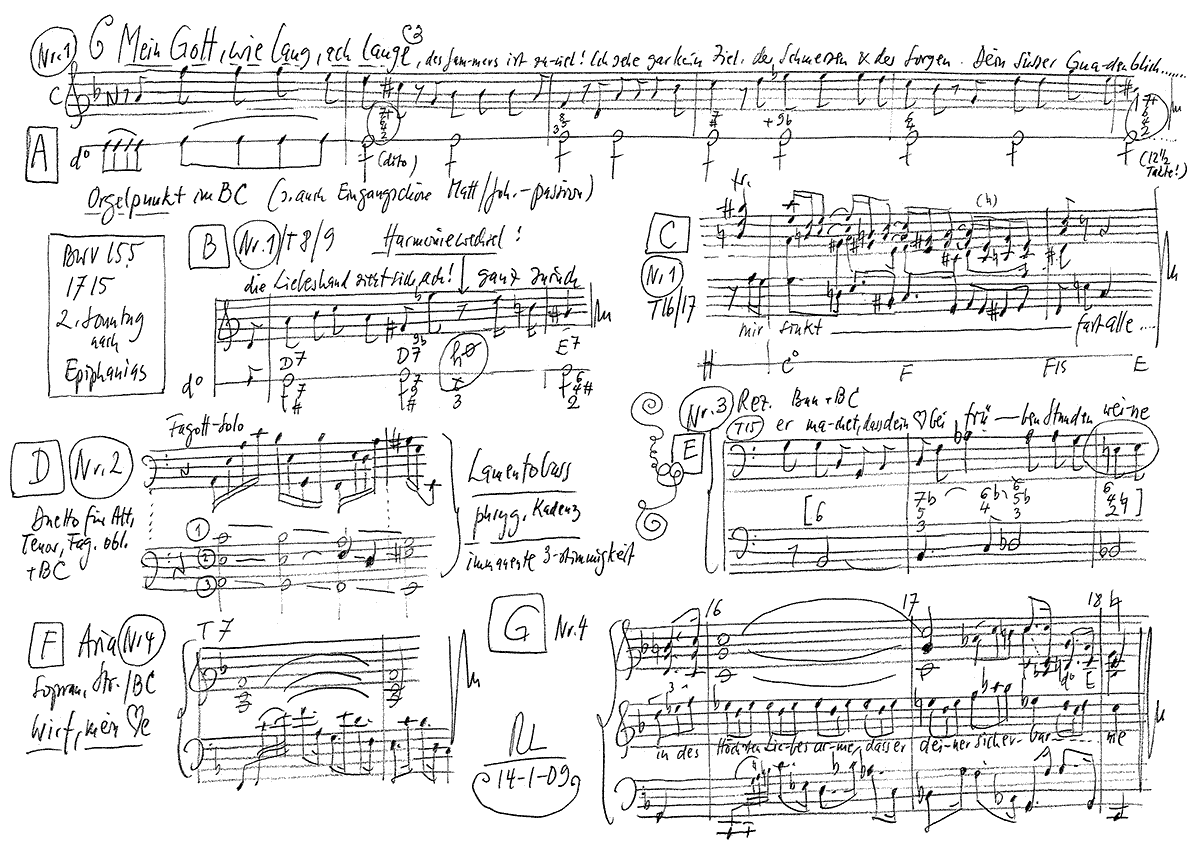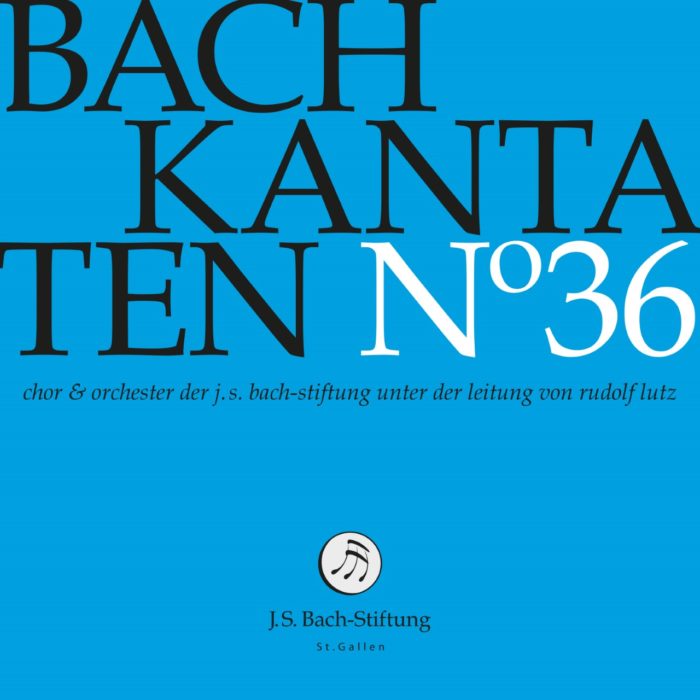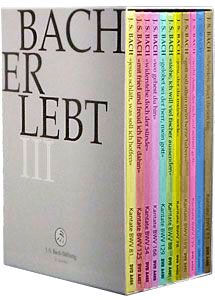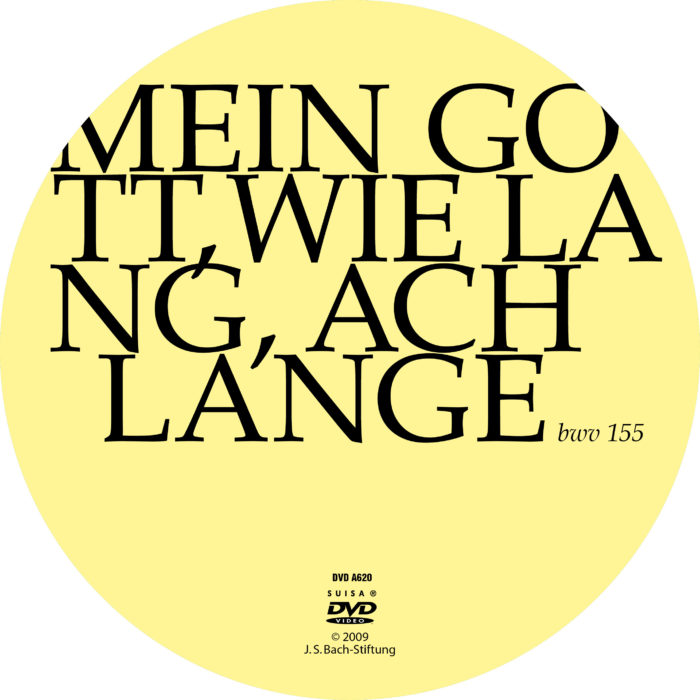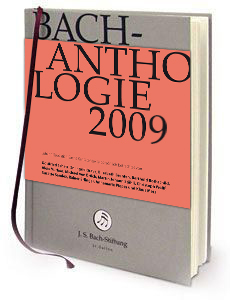Mein Gott, wie lang, ach lange
BWV 155 // For the Second Sunday after Epiphany
(My God, how long, how long then?) for soprano, alto, tenor and bass, basoon, strings and continuo.
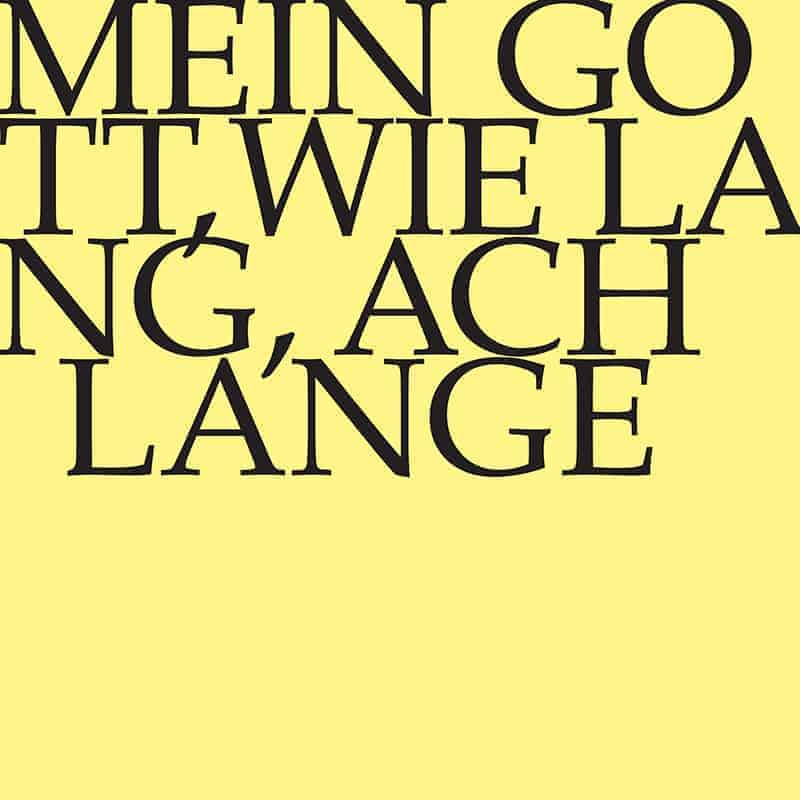
Would you like to enjoy our videos ad-free? Subscribe to YouTube Premium now...
Workshop
Reflective lecture
Orchestra
Conductor
Rudolf Lutz
Violin
Renate Steinmann, Fanny Tschanz
Viola
Susanna Hefti
Violoncello
Maya Amrein
Violone
Iris Finkbeiner
Bassoon
Donna Agrell
Organ
Rudolf Lutz
Musical director & conductor
Rudolf Lutz
Workshop
Participants
Karl Graf, Rudolf Lutz
Reflective lecture
Speaker
Hugo Loetscher
Recording & editing
Recording date
01/16/2009
Recording location
Trogen
Sound engineer
Stefan Ritzenthaler
Director
Meinrad Keel
Production manager
Johannes Widmer
Production
GALLUS MEDIA AG, Switzerland
Producer
J.S. Bach Foundation of St. Gallen, Switzerland
Librettist
Text No. 1–4
Salomo Franck (1659–1725)
Text No. 5
Paul Speratus (1484–1551)
First performance
Second Sunday after Epiphany,
19 January 1716, Weimar
In-depth analysis
Set to a text by Salomo Franck, cantata BWV 155 was composed during Bach’s Weimar years for performance on 19 January 1716 in the palace chapel “Weg zum Himmelsburg”. Thanks to a text booklet from 1724 found in a library in St Petersburg, we also know that Bach revived the work during his first year of service in Leipzig.
Rather than opening with a tutti movement, the cantata commences with what is nominally a recitative, although the setting by both Bach and Franck is particularly rich, with profound music-theological references and a sensitive string accompaniment. In this movement, the throbbing quavers of the continuo part suggest the pathos of a Passion composition, while the high vocal part, set over a striking progression of interrupted cadences, cuts deep to the heart. The way Bach transforms the fleeting memory of the sparkling “Freudenwein” (wine of joy) into a melancholy “sinken aller Zuversicht” (fall of all confidence) – and thus into a cup of tears – is of exceptional compositional mastery. When the movement concludes in a disturbingly remote A major, the listener is left, after a mere 18 bars, stunned by this turn of events.
Equally surprising as this emotional aboutface are the form and instrumentation of the following aria in A minor, “Du musst glauben, du musst hoffen” (Thou be faithful, thou be hopeful). Here the alto and tenor engage in a trusting, consonant duet, while above accompanying continuo quavers, the sonorous obbligato bassoon presides like mercy itself over this consoling meeting of two concerned friends. The middle section set to the text of “Jesus weiss die rechten Stunden” (Jesus knows the proper hour) offers hope of imminent relief: even the most trying of times shall pass and the heart of the Highest will open again – although an audible struggle still lies ahead before insight and divine serenity can be attained.
The bass recitative reaffirms this summons to have faith in the face of all outward difficulty and to place trust in the impending transformation of “bittren Zähren” (bitter weeping) into “Freudenwein und Honigseim” (joy the wine and honey sweet). For this vital message of solace, the heavenly prince seems to have sent his most noble messenger, who with warmth and understanding renders plausible the notion of suffering as a test of faith. A short but sonorous continuo postlude takes up this idea of yielding to God, offering a tacit “Yes” in response.
In the ensuing soprano aria, the soloist appears completely transformed. Over an energetic string accompaniment of dotted rhythms, the vocal part expresses not the urgent desperation of the opening movement but a passionate desire to run headlong into the “Liebesarme” (loving bosom) of the Highest and receive his mercy as a physical act of healing presence. For this, Bach composes a wonderful setting in F major, whose exalted rapture evokes this embrace in closely intertwined phrases. While the composer maintains an equal sense of hope and tension in this setting, the librettist Franck also remains true to his metaphor by suggesting that the faithful place their “Joch der Sorgen” (yoke of sorrows) on the “Achseln seiner Gnade” (shoulders of his mercy). In this pious, operalike aria, the lack of a da capo section then reinforces the notion of purposeful movement towards Jesus.
The closing chorale, indicated in the score only by a brief marking in the bass vocal part, is a setting of “Es ist das Heil uns kommen her”, an early Reformation hymn by Paulus Speratus that inspires trust in moments of doubt, when courage is lacking. When the organ interludes inspire from the singers a healing “Dennoch” (Yet) that also overcomes the “lauter Nein!” (say only no!) of the second-last line, the muted F major of the preceding aria takes on a mighty tone of victory nigh unthinkable at the beginning of the cantata.
Libretto
1. Rezitativ (Sopran)
Mein Gott, wie lang, ach lange?
Des Jammers ist zuviel!
Ich sehe gar kein Ziel
der Schmerzen und der Sorgen.
Dein süßer Gnadenblick
hat unter Nacht und Wolken sich verborgen,
die Liebeshand zieht sich, ach! ganz zurück;
um Trost ist mir sehr bange.
Ich finde, was mich Armen täglich kränket,
das Tränenmaß wird stets voll eingeschenket,
der Freudenwein gebricht;
mir sinkt fast alle Zuversicht.
2. Arie (Duett Alt, Tenor)
Du mußt glauben, du mußt hoffen,
du mußt Gott gelassen sein!
Jesus weiß die rechten Stunden,
dich mit Hülfe zu erfreun.
Wenn die trübe Zeit verschwunden,
steht sein ganzes Herz dir offen.
3. Rezitativ (Bass)
So sei, o Seele, sei zufrieden!
Wenn es vor deinen Augen scheint,
als ob dein liebster Freund
sich ganz von dir geschieden;
wenn er dich kurze Zeit verläßt,
Herz! glaube fest,
es wird ein kleines sein,
da er für bittre Zähren
den Trost- und Freudenwein
und Honigseim für Wermut will gewähren!
Ach! denke nicht,
daß er von Herzen dich betrübe,
er prüfet nur durch Leiden deine Liebe;
er machet, daß dein Herz bei trüben Stunden weine,
damit sein Gnadenlicht
dir desto lieblicher erscheine;
er hat, was dich ergötzt,
zuletzt
zu deinem Trost dir vorbehalten;
drum laß ihn nur, o Herz, in allem walten!
4. Arie (Sopran)
Wirf, mein Herze, wirf dich noch
in des Höchsten Liebesarme,
daß er deiner sich erbarme.
Lege deiner Sorgen Joch,
und was dich bisher beladen,
auf die Achseln seiner Gnaden.
5. Choral
Ob sichs anließ, als wollt er nicht,
laß dich es nicht erschrecken,
denn wo er ist am besten mit,
da will ers nicht entdecken.
Sein Wort laß dir gewisser sein,
und ob dein Herz spräch lauter Nein,
so laß doch dir nicht grauen.



